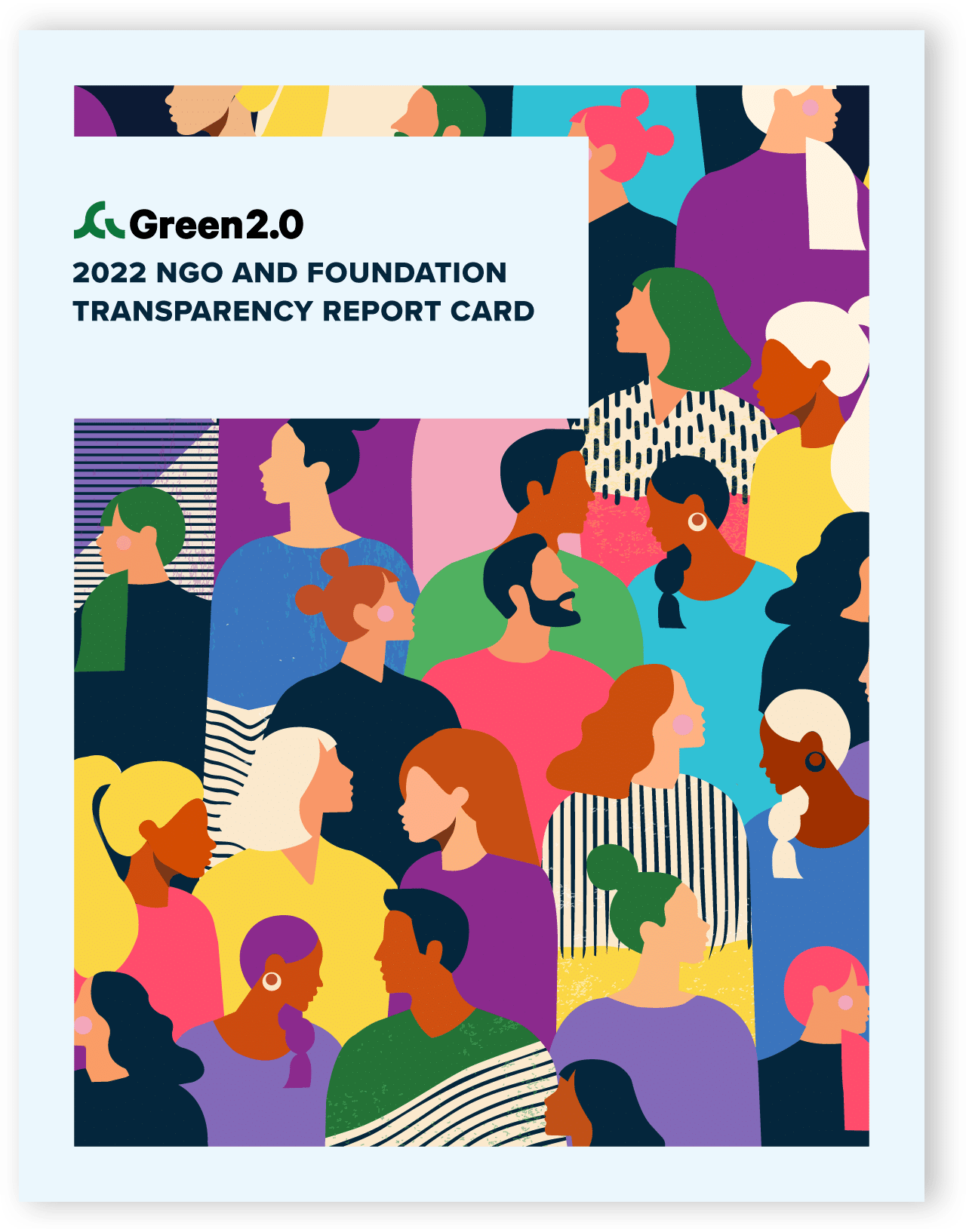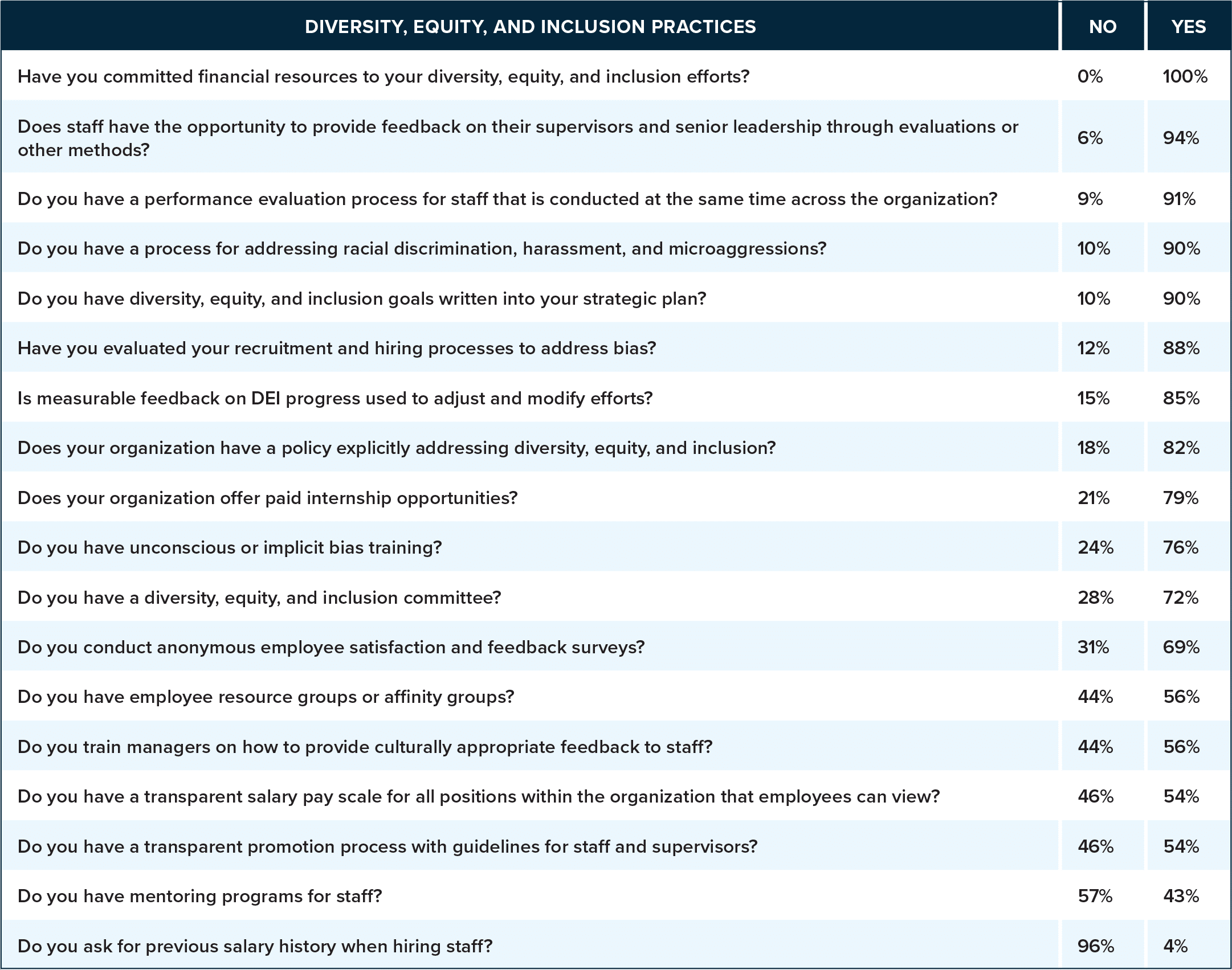
For the sixth consecutive year, Green 2.0—an independent 501(c)(3) organization working to increase racial and ethnic diversity within the environmental movement—presents the NGO and Foundation Transparency Report Card. This report provides critical data on the diversity found on the staffs and boards of non-governmental organizations (NGOs) and foundations. This year, Green 2.0 has sustained its commitment to encouraging organizations to be transparent and accountable, while using data to inform their metrics, goals, and strategic plans.
Introduction
The 2022 report card reflects data collected from NGOs on the number of people of color (POC) on their full-time staffs, boards, senior staffs, and heads of organizations, as well as diversity, equity, and inclusion (DEI) practices (with several new questions presented to obtain more insight into organizational culture). Green 2.0 also returned to the pre-2021 practice of collecting demographic data from environmental foundations to gauge the internal progress of staff compositions (in 2021, we collected information only on grantmaking practices). In addition, the report card reflects data collected from foundations on the number of people of color (POC) on their full-time staffs, boards, senior staffs, and heads of organizations and includes a question on demographic data practices related to grantmaking.
NGO Results
Data collected indicated some measurable progress on the number of people of color (POC) on full-time staffs, senior staffs, and boards of NGOs:
- Full-Time Staff: On average, reporting organizations added 21 people of color between 2017 and 2022.
- Senior Staff: On average, reporting organizations added two people of color between 2017 and 2022.
- Board Members: On average, reporting organizations added three people of color between 2017 and 2022.
- Heads of Organizations: Reporting organizations added three people of color between 2021 and 2022.
NGO Full-Time Staff
- White
- Hispanic/Latinx
- Black or African American
- Asian
- Multiple Races/Ethnicities
- Do Not Have Data
- American Indian or Alaska Native
- Prefer Not To Answer
- Native Hawaiian or Pacific Islander
- Middle Eastern or North African
- Another Race or Ethnicity Not On The List
NGO Heads of Organizations
- White
- Asian
- Black or African American
- American Indian or Alaska Native
- Hispanic/Latinx
- Multiple Races/Ethnicities
NGO SENIOR STAFF
- White
- Black or African American
- Hispanic/Latinx
- Asian
- Do Not Have Data
- Multiple Races/Ethnicities
- Native Hawaiian or Pacific Islander
- American Indian or Alaska Native
- Middle Eastern or North African
NGO BOARD MEMBERS
- White
- Black or African American
- Do Not Have Data
- Hispanic/Latinx
- Asian
- Native Hawaiian or Pacific Islander
- Multiple Races/Ethnicities
- American Indian or Alaska Native
- Middle Eastern or North African
- Prefer Not To Answer
NGO Diversity, Equity, and Inclusion Practices
Looking beyond demographic numbers, for the second year in a row, Green 2.0 examined organizational practices that could contribute to creating and reinforcing policies and cultures that support a diverse workforce.

AVERAGE PAID PARENTAL LEAVE OF NGOS
Participating NGOs reported they provide eight weeks of paid parental leave on average. The paid leave benefit ranged from zero to 20 weeks, with the most reported figure being 12 weeks. We consider zero paid parental leave unacceptable if equitable staff support is the goal. We recommend organizations review and consider if their current paid leave policies provide enough time off to allow for the equitable, safe, and healthy support of staff and families.
Foundation Results
We found that staff of color comprise 43% of full-time staffs across foundations. The proportion of staff of color decreases in roles that are more senior and influential, such as senior staff (35.2%), heads of organizations (20%) and boards (24.3%), respectively.
Foundation Full-Time Staff
- White
- Asian
- Black or African American
- Hispanic/Latinx
- Multiple Races/Ethnicities
- Prefer Not To Answer
- American Indian or Alaska Native
- Do Not Have Data
- Middle Eastern or North African
- Native Hawaiian or Pacific Islander
Foundation Heads of Organizations
- White
- Black or African American
- Do Not Have Data
- Hispanic/Latinx
Foundation Senior Staff
- White
- Black or African American
- Asian
- Do Not Have Data
- Hispanic/Latinx
- Multiple Races/Ethnicities
Foundation Board Members
- White
- Do Not Have Data
- Black or African American
- Hispanic/Latinx
- Asian
- Middle Eastern or North African
- Multiple Races/Ethnicities
- Another Race or Ethnicity Not On The List
Have a question?
Is your organization interested in participating in our next report card? Do you have questions about the data?
Contact us at Reportcard[at]diversegreen.org.

Featuring 68 NGOs and 20 foundations, new components of the 2022 report card include a detailed breakdown of racial and ethnic demographics across all levels of leadership and additional DEI questions (including those related to pay equity practices and paid parental leave).
